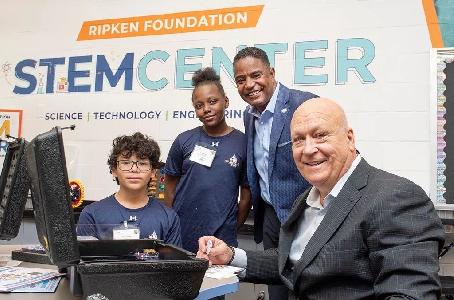Between stops in Iowa and New Hampshire, former Maryland Gov. Martin O’Malley stopped by DLA Piper on Friday morning for an executive edition of TechBreakfast. (There were roundtables and, more importantly, bacon.)
The former Baltimore mayor who may or may not be running for another higher office sometime in the near future didn’t demo. But in true tech fashion, most of his presentation was AMA style. As he fielded questions from tech community members like ZeroFox’s Mike Passaro, Startup Maryland’s Mike Binko and Snake Hill’s Daniel Schiavone, a few key themes emerged that reflect O’Malley’s thinking about how Maryland’s innovation economy can further grow.
In honor of that little basketball tournament happening this weekend, let’s pick four:
1. Don’t be so hard on yourself.
O’Malley said Marylanders are “pathologically modest.” He repeatedly said that Maryland needs to get better at telling its own story if it wants to continue to grow.
“We’re a great state, but we have a bad habit of talking down our state, and talking down our assets,” he said in one response.
Unable to resist a partisan jab, he said Maryland only trailed Virginia in job growth during Republican Gov. Robert Ehrlich’s four years in office.
“During those four years it seemed like the message coming out of DBED and the messages coming out of our political leadership was about how much we stink for business,” he said. “Expectations become behavior.”
And he ended with a rhetorical crescendo about Maryland’s many assets, saying Baltimore’s “biggest enemy” in turning the city around “was our lack of belief in ourselves.”
2. “Demand” more technical education.
O’Malley favors redesigning the fourth year of high school to provide opportunities for students to get college credit, and gain computer skills. He was especially emphatic about expanding career and technical education (CTE) learning, saying that it was the place where the tech community could make the biggest difference.
“If there were one thing that I would like to see our cyber and IT community do in conjunction with our state local and government, it would be to insist — demand — greater throughput on CTE skills for our kids by the time they leave high school,” he said.
3. Take down the silos.
“If you look at all the assets in terms of venture capital, institutions and businesses from the Mason Dixon line down to the border of North Carolina, if you put us together with any cluster in the country, I don’t care whether it’s Silicon Valley or even in New England, we would stack up,” O’Malley said. “Instead we sort of silo ourselves off.”
O’Malley also said universities could do more to encourage interdisciplinary learning. He pointed to UMBC’s cohorts as an example of a program that encourages students to dig into multiple fields as they look to reach goals.
4. Disrupt energy.
The AMA format allowed for the “next Uber” question to come up. Snake Hill’s Schivaone asked O’Malley what sector the startup community should focus on disrupting next, now that cabs and hotel rooms have already been done.
O’Malley’s answer: “Distributed energy generation and energy savings.”
“In the energy industry, we’ve had this notion that all energy comes from a concentrated production source and then gets distributed out,” he said, which was a fancy way of saying, “power plants.”
“We have to figure out how to change that, and change it quickly, before the planet burns up,” he said.
About 2016…
O’Malley introduced himself as a “Visiting Professor at the Johns Hopkins Carey School of Business,” which elicited a knowing laugh from the crowd. At the end of the session, talk turned from tech to politics, for just a moment.
The takeaway: He’ll decide whether to run for president — “or not” — by the end of May.
Join the conversation!
Find news, events, jobs and people who share your interests on Technical.ly's open community Slack

Baltimore daily roundup: Medtech made in Baltimore; Sen. Sanders visits Morgan State; Humane Ai review debate

Baltimore daily roundup: The city's new esports lab; a conference in Wilmington; GBC reports $4B of economic activity

Baltimore daily roundup: Find your next coworking space; sea turtle legislation; Dali raided and sued


